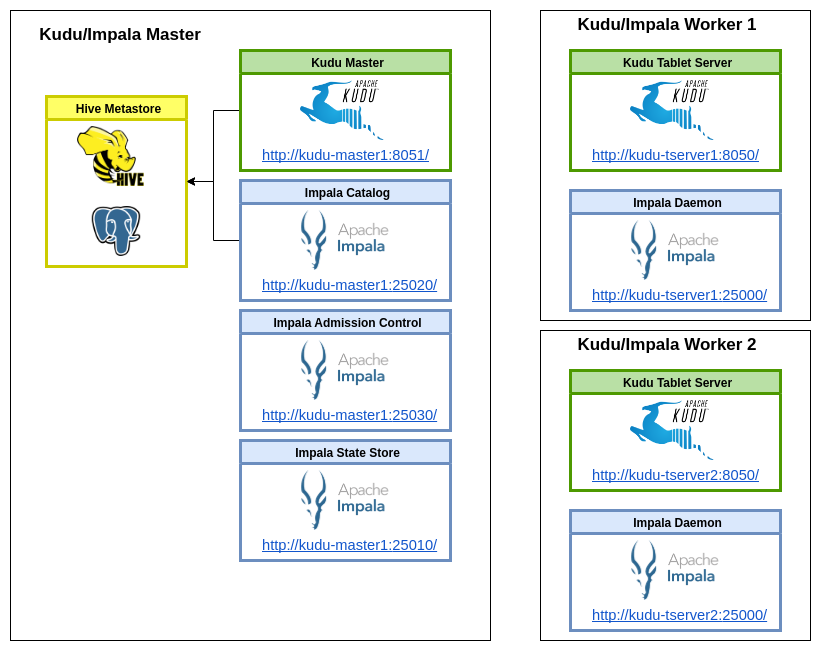 |
 |
Table of Contents
Introducction
In this very practical article, we will build two of the most interesting technologies in the Big Data ecosystem: Apache kudu and Apache Impala. We will build both technologies from source code, package them and deploy them with the minimum configurations to make them functional (we will avoid performance related configuration on this occasion) and additionally we will use Apache Impala making it as independent as possible from HDFS.
It is known that Apache Kudu and Apache Impala release their versions in “Source Release” form, therefore they do not make the binaries of these technologies available. This forces users to build such projects from source code. Generally the projects of the Big Data ecosystem and the Apache Software Foundation are based on Java code, which makes them easier to build and in particular to distribute (in most cases only a JVM is needed on the machine to be deployed).
In the case of Apache Kudu and Apache Impala this is not the case, they are two projects whose code base is C++, which makes their construction and in particular their distribution in the target systems somewhat more complicated.
Built Versions
To build the two technologies we will use the “main” branch of the two projects, the result is therefore the “versions to come”, they are development versions, in particular:
- Apache Kudu – 1.17.0-SNAPSHOT
- Apache Impala – 4.1.0-SNAPSHOT
For building the source code will use CentOS 7.x as development platform, thinking we are going to deploy the technologies into CentOS 7.x based hosts.
Building Kudu – 1.17.0-SNAPSHOT
sudo yum -y install autoconf automake curl cyrus-sasl-devel cyrus-sasl-gssapi \ cyrus-sasl-plain flex gcc gcc-c++ gdb git java-1.8.0-openjdk-devel \ krb5-server krb5-workstation libtool make openssl-devel patch pkgconfig \ redhat-lsb-core rsync unzip vim-common which centos-release-scl-rh \ devtoolset-8 tree vim
git clone https://github.com/apache/kudu kudu.git
cd kudu.git
build-support/enable_devtoolset.sh thirdparty/build-if-necessary.sh
mkdir -p build/release
cd build/release
../../build-support/enable_devtoolset.sh \
../../thirdparty/installed/common/bin/cmake \
-DCMAKE_BUILD_TYPE=release \
../..
make -j4
sudo mkdir /opt/kudu && sudo chown -R ${USER}: /opt/kudu
make DESTDIR=/opt/kudu install
In the case of Apache Kudu, thanks to the “make install” rule, it is easy to organize the artifacts and their dependencies for subsequent packaging and deployment. Let’s take a look at the generated artifacts.
/opt/kudu/
└── usr
└── local
├── share (lots of files)
├── include (losts of files)
├── bin
│ └── kudu (the CLI)
├── lib64
│ ├── libkudu_client.so -> libkudu_client.so.0
│ ├── libkudu_client.so.0 -> libkudu_client.so.0.1.0
│ └── libkudu_client.so.0.1.0
└── sbin
├── kudu-master
└── kudu-tserver
# We have to copy manually the document root front end:
cp -r kudu.git/www/ /opt/kudu/usr/local/
# We have to copy HMS Kudu plugin manually:
mkdir /opt/usr/local/lib
cp kudu.git/build/release/bin/hms-plugin.jar /opt/kudu/usr/local/lib
Packaging
rm -fr /opt/kudu/usr/local/share rm -fr /opt/kudu/usr/local/include tar cvzf kudu-1.17.0-SNAPSHOT.tar.gz /opt/kudu (514 MB compressed)
Installation
All Machines
scp kudu-1.17.0-SNAPSHOT.tar.gz <all-nodes>: sudo yum install cyrus-sasl-gssapi cyrus-sasl-plain cyrus-sasl-devel krb5-server krb5-workstation openssl lzo-devel tzdata sudo mkdir -p /var/lib/kudu/wal sudo mkdir -p /var/lib/kudu/data sudo mkdir -p /var/log/kudu sudo adduser -r kudu sudo chown -R kudu: /var/lib/kudu sudo chown -R kudu: /var/log/kudu sudo tar xvzf kudu-1.17.0-SNAPSHOT.tar.gz -C / sudo mkdir /opt/kudu/conf sudo chown -R kudu: /opt/kudu/
Single Kudu Master Machine
cat << EOF | sudo tee /opt/kudu/conf/master.gflagfile --webserver_doc_root=/opt/kudu/usr/local/www --log_dir=/var/log/kudu --fs_wal_dir=/var/lib/kudu/wal --fs_data_dirs=/var/lib/kudu/data --rpc_encryption=optional --rpc_authentication=optional --rpc_negotiation_timeout_ms=5000 EOF sudo chown kudu: /opt/kudu/conf/master.gflagfile cat << EOF | sudo tee /etc/systemd/system/kudu-master.service [Unit] Description=Apache Kudu Master Server Documentation=http://kudu.apache.org [Service] Environment=KUDU_HOME=/var/lib/kudu ExecStart=/opt/kudu/usr/local/sbin/kudu-master --flagfile=/opt/kudu/conf/master.gflagfile TimeoutStopSec=5 Restart=on-failure User=kudu [Install] WantedBy=multi-user.target EOF sudo systemctl daemon-reload sudo systemctl start kudu-master sudo systemctl enable kudu-master
Kudu Tablet Server Machines
cat << EOF | sudo tee /opt/kudu/conf/tserver.gflagfile --tserver_master_addrs=kudu-master1.node.keedio.cloud:7051 --webserver_doc_root=/opt/kudu/usr/local/www --log_dir=/var/log/kudu --fs_wal_dir=/var/lib/kudu/wal --fs_data_dirs=/var/lib/kudu/data --rpc_encryption=optional --rpc_authentication=optional --rpc_negotiation_timeout_ms=5000 EOF sudo chown kudu: /opt/kudu/conf/tserver.gflagfile cat << EOF | sudo tee /etc/systemd/system/kudu-tserver.service [Unit] Description=Apache Kudu Tablet Server Documentation=http://kudu.apache.org [Service] Environment=KUDU_HOME=/var/lib/kudu ExecStart=/opt/kudu/usr/local/sbin/kudu-tserver --flagfile=/opt/kudu/conf/tserver.gflagfile TimeoutStopSec=5 Restart=on-failure User=kudu [Install] WantedBy=multi-user.target EOF sudo systemctl daemon-reload sudo systemctl start kudu-tserver sudo systemctl enable kudu-tserver
Building Impala – 4.1.0-SNAPSHOT
git clone https://github.com/apache/impala.git cd impala export IMPALA_HOME=$PWD ./bin/bootstrap_system.sh source ./bin/impala-config.sh ./buildall.sh -noclean -notests
Packaging
mkdir -p /opt/impala/lib64
mkdir /opt/impala/sbin
mkdir /opt/impala/lib
mkdir /opt/impala/bin
cp -r impala/www/ /opt/impala/
cp \
impala/toolchain/toolchain-packages-gcc7.5.0/gcc-7.5.0/lib64/libgcc_s.so.1 \
impala/toolchain/toolchain-packages-gcc7.5.0/gcc-7.5.0/lib64/libstdc++.so.6.0.24 \
/opt/impala/lib64
cp impala/toolchain/toolchain-packages-gcc7.5.0/kudu-67ba3cae45/debug/lib64/libkudu_client.so.0.1.0 /opt/impala/lib64/
cp -P impala/be/build/debug/service/* /opt/impala/sbin/
cp impala/fe/target/impala-frontend-4.1.0-SNAPSHOT.jar /opt/impala/lib
cp impala/fe/target/dependency/*.jar /opt/impala/lib
cp -r impala/shell/build/impala-shell-4.1.0-SNAPSHOT /opt/impala/bin/shell
cp -r impala/toolchain/cdp_components-23144489/apache-hive-3.1.3000.7.2.15.0-88-bin/ /opt/hive
cp -r impala/toolchain/cdp_components-23144489/hadoop-3.1.1.7.2.15.0-88/ /opt/hadoop
tar cvzf impala-4.1.0-SNAPSHOT.tar.gz \
-P /opt/impala/ \
-P /opt/hive/ \
-P /opt/hadoop/ # (1861 MB compressed)
Installation
All Machines
scp impala-4.1.0-SNAPSHOT.tar.gz <all-nodes>: sudo yum install -y java-1.8.0-openjdk-devel sudo adduser -r impala sudo mkdir /var/log/impala sudo chown -R impala: /var/log/impala sudo mkdir /opt/impala/conf sudo chown -R impala: /opt/impala/conf sudo tar xzf impala-4.1.0-SNAPSHOT.tar.gz -P -C / sudo chown -R impala: /opt/impala/ sudo tee /etc/ld.so.conf.d/impala.conf <<EOF /opt/impala/lib64 EOF
HMS In Master Machine
We install Hive Metastore on the Kudu and Impala Master (obviously it can be installed independently).
sudo yum install -y postgresql postgresql-server postgresql-contrib postgresql-jdbc sudo postgresql-setup initdb sudo sed -i "s/\#listen_addresses =.*/listen_addresses = \'*\'/g" /var/lib/pgsql/data/postgresql.conf echo 'host all all 0.0.0.0/0 md5' | sudo tee -a /var/lib/pgsql/data/pg_hba.conf sudo systemctl start postgresql sudo systemctl enable postgresql sudo -u postgres psql -c "ALTER USER postgres PASSWORD 'postgres';" sudo -u postgres psql -c "CREATE DATABASE metastore;" psql postgresql://postgres:postgres@kudu-master1.node.keedio.cloud -c '\l' | grep metastore sudo adduser -r hive sudo chown -R hive: /opt/hive/ sudo ln -s /usr/share/java/postgresql-jdbc.jar /opt/hive/lib/ sudo cp /opt/kudu/usr/local/lib/hms-plugin.jar /opt/hive/lib sudo chown hive: /opt/hive/lib/hms-plugin.jar sh impala-config.sh /opt/hive/bin/schematool -initSchema -dbType postgres sudo systemctl start metastore sudo systemctl start impala-statestore sudo systemctl start impala-catalog sudo systemctl start impala-admission sudo systemctl enable metastore sudo systemctl enable impala-statestore sudo systemctl enable impala-catalog sudo systemctl enable impala-admission
Multiple Impala Servers
The Impala Servers are only in the Kudu Tablet Servers nodes (the workers).
sudo adduser -r hive sudo chown -R hive: /opt/hive/ sudo ln -s /usr/share/java/postgresql-jdbc.jar /opt/hive/lib/ sudo cp /opt/kudu/usr/local/lib/hms-plugin.jar /opt/hive/lib sudo chown hive: /opt/hive/lib/hms-plugin.jar sh impala-config.sh sudo systemctl start impala sudo systemctl enable impala
impala-config.sh helper script
cat << EOF | sudo tee /etc/systemd/system/impala.service
[Unit]
Description=Apache Impala Daemon
Documentation=http://impala.apache.org
[Service]
EnvironmentFile=/opt/impala/conf/impala.env
ExecStart=/opt/impala/sbin/impalad --flagfile=/opt/impala/conf/impala.gflagfile
TimeoutStopSec=5
Restart=on-failure
User=impala
[Install]
WantedBy=multi-user.target
EOF
cat << EOF | sudo tee /etc/systemd/system/impala-catalog.service
[Unit]
Description=Apache Impala Catalog Daemon
Documentation=http://impala.apache.org
[Service]
EnvironmentFile=/opt/impala/conf/impala.env
ExecStart=/opt/impala/sbin/catalogd --flagfile=/opt/impala/conf/catalog.gflagfile
TimeoutStopSec=5
Restart=on-failure
User=impala
[Install]
WantedBy=multi-user.target
EOF
cat << EOF | sudo tee /etc/systemd/system/impala-statestore.service
[Unit]
Description=Apache Impala StateStore Daemon
Documentation=http://impala.apache.org
[Service]
EnvironmentFile=/opt/impala/conf/impala.env
ExecStart=/opt/impala/sbin/statestored --flagfile=/opt/impala/conf/statestore.gflagfile
TimeoutStopSec=5
Restart=on-failure
User=impala
[Install]
WantedBy=multi-user.target
EOF
cat << EOF | sudo tee /etc/systemd/system/impala-admission.service
[Unit]
Description=Apache Impala Admission Control Daemon
Documentation=http://impala.apache.org
[Service]
EnvironmentFile=/opt/impala/conf/impala.env
ExecStart=/opt/impala/sbin/admissiond --flagfile=/opt/impala/conf/admission.gflagfile
TimeoutStopSec=5
Restart=on-failure
User=impala
[Install]
WantedBy=multi-user.target
EOF
cat << EOF | sudo tee /opt/impala/conf/impala.env
IMPALA_HOME=/opt/impala
JAVA_HOME=/usr/lib/jvm/java/
CLASSPATH=/opt/impala/lib/*:/opt/hive/lib/*
HADOOP_HOME=/opt/hadoop
HIVE_HOME=/opt/hive
HIVE_CONF=/opt/hive/conf
EOF
sudo chown impala: /opt/impala/conf/impala.env
cat << EOF | sudo tee /opt/impala/conf/impala.gflagfile
--abort_on_config_error=false
--log_dir=/var/log/impala
--state_store_host=kudu-master1.node.keedio.cloud
--catalog_service_host=kudu-master1.node.keedio.cloud
--admission_service_host=kudu-master1.node.keedio.cloud
--kudu_master_hosts=kudu-master1.node.keedio.cloud
--enable_legacy_avx_support=true
EOF
sudo chown impala: /opt/impala/conf/impala.gflagfile
cat << EOF | sudo tee /opt/impala/conf/catalog.gflagfile
--kudu_master_hosts=kudu-master1.node.keedio.cloud
--log_dir=/var/log/impala
--enable_legacy_avx_support=true
EOF
sudo chown impala: /opt/impala/conf/catalog.gflagfile
cat << EOF | sudo tee /opt/impala/conf/statestore.gflagfile
--kudu_master_hosts=kudu-master1.node.keedio.cloud
--log_dir=/var/log/impala
--enable_legacy_avx_support=true
EOF
sudo chown impala: /opt/impala/conf/statestore.gflagfile
cat << EOF | sudo tee /opt/impala/conf/admission.gflagfile
--kudu_master_hosts=kudu-master1.node.keedio.cloud
--log_dir=/var/log/impala
--enable_legacy_avx_support=true
EOF
sudo chown impala: /opt/impala/conf/admission.gflagfile
cat << EOF | sudo tee /etc/systemd/system/metastore.service
[Unit]
Description=Apache Hive Metastore - HSM
Documentation=http://hive.apache.org
[Service]
Type=simple
Environment=JAVA_HOME=/usr/lib/jvm/java/
Environment=HADOOP_HOME=/opt/hadoop
ExecStart=/opt/hive/bin/hive --service metastore --hiveconf hive.root.logger=DEBUG,console
TimeoutStopSec=5
Restart=on-failure
User=hive
[Install]
WantedBy=multi-user.target
EOF
cat << EOF | sudo tee /opt/hive/conf/hive-site.xml
<configuration>
<property>
<name>hive.metastore.uris</name>
<value>thrift://kudu-master1.node.keedio.cloud:9083</value>
<description>Thrift URI for the remote metastore.
Used by metastore client to connect to remote metastore.
</description>
</property>
<property>
<name>hive.metastore.warehouse.dir</name>
<value>/var/lib/hive/warehouse</value>
<description>location of default database for the warehouse</description>
</property>
<property>
<name>metastore.task.threads.always</name>
<value>org.apache.hadoop.hive.metastore.events.EventCleanerTask</value>
</property>
<property>
<name>metastore.expression.proxy</name>
<value>org.apache.hadoop.hive.metastore.DefaultPartitionExpressionProxy</value>
</property>
<property>
<name>javax.jdo.option.ConnectionDriverName</name>
<value>org.postgresql.Driver</value>
</property>
<property>
<name>javax.jdo.option.ConnectionURL</name>
<value>jdbc:postgresql://kudu-master1.node.keedio.cloud:5432/metastore</value>
</property>
<property>
<name>javax.jdo.option.ConnectionUserName</name>
<value>postgres</value>
</property>
<property>
<name>javax.jdo.option.ConnectionPassword</name>
<value>postgres</value>
</property>
<property>
<name>hive.metastore.transactional.event.listeners</name>
<description>
KEY connection with KUDU from (artifact from Kudu release): hms-plugin.jar
</description>
<value>
org.apache.hive.hcatalog.listener.DbNotificationListener,
org.apache.kudu.hive.metastore.KuduMetastorePlugin
</value>
</property>
<property>
<name>hive.metastore.disallow.incompatible.col.type.changes</name>
<value>false</value>
</property>
<property>
<!-- Required for automatic metadata sync. -->
<name>hive.metastore.dml.events</name>
<value>true</value>
</property>
<property>
<name>hive.metastore.event.db.notification.api.auth</name>
<value>false</value>
<description>
Should metastore do authorization against database notification
related APIs such as get_next_notification.
If set to true, then only the superusers in proxy settings have the permission
</description>
</property>
</configuration>
EOF
cat << EOF | sudo tee /opt/hadoop/etc/hadoop/core-site.xml
<configuration>
<property>
<name>dfs.namenode.name.dir</name>
<value>/cluster/nn</value>
</property>
<property>
<name>dfs.datanode.data.dir</name>
<value>/cluster/1/dn,/cluster/2/dn</value>
</property>
<property>
<name>dfs.replication</name>
<value>3</value>
</property>
</configuration>
EOF
cat << EOF | sudo tee /opt/hadoop/etc/hadoop/hdfs-site.xml
<configuration>
<property>
<name>fs.default.name</name>
<value>file://var/lib/hive</value>
<description>fake hdfs</description>
</property>
</configuration>
EOF
Enabling Kudu Sync with Metastore
Kudu has an optional feature which allows it to integrate its own catalog with the Hive Metastore (HMS). The HMS is the de-facto standard catalog and metadata provider in the Hadoop ecosystem. When the HMS integration is enabled, Kudu tables can be discovered and used by external HMS-aware tools (in our case the Impala Server).
Kudu has tight integration with Apache Impala, allowing you to use Impala to insert, query, update, and delete data from Kudu tablets using Impala’s SQL syntax, as an alternative to using the Kudu APIs to build a custom Kudu application. In addition, you can use JDBC or ODBC to connect existing or new applications written in any language, framework, or business intelligence tool to your Kudu data, using Impala as the broker.
cat /opt/kudu/conf/master.gflagfile --webserver_doc_root=/opt/kudu/usr/local/www --log_dir=/var/log/kudu --fs_wal_dir=/var/lib/kudu/wal --fs_data_dirs=/var/lib/kudu/data --rpc_encryption=optional --rpc_authentication=optional --rpc_negotiation_timeout_ms=5000 --hive_metastore_uris=thrift://kudu-master1.node.keedio.cloud:9083 sudo systemctl restart kudu-master
Final Architecture
